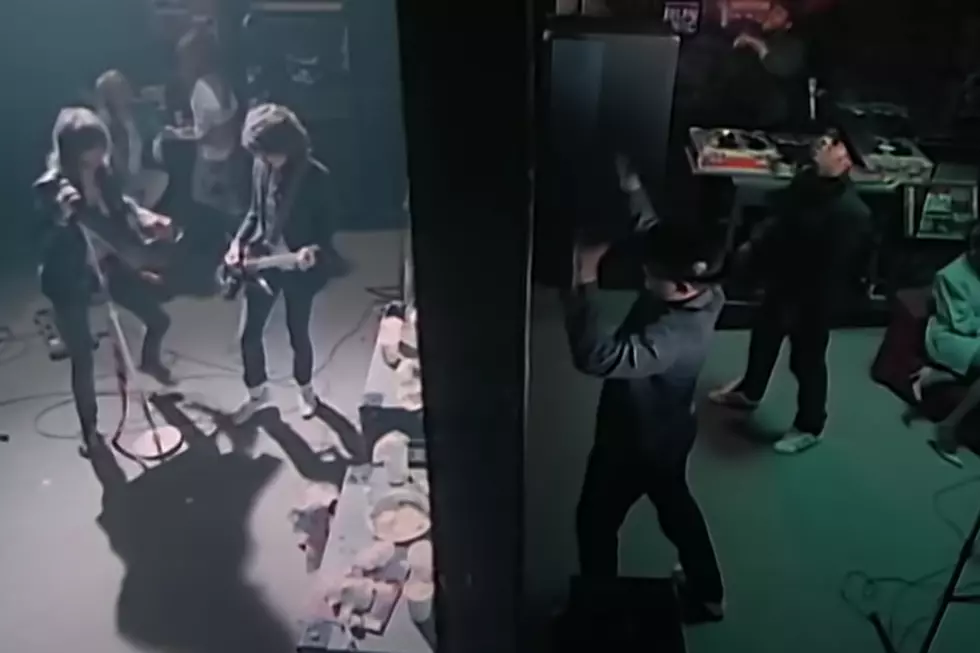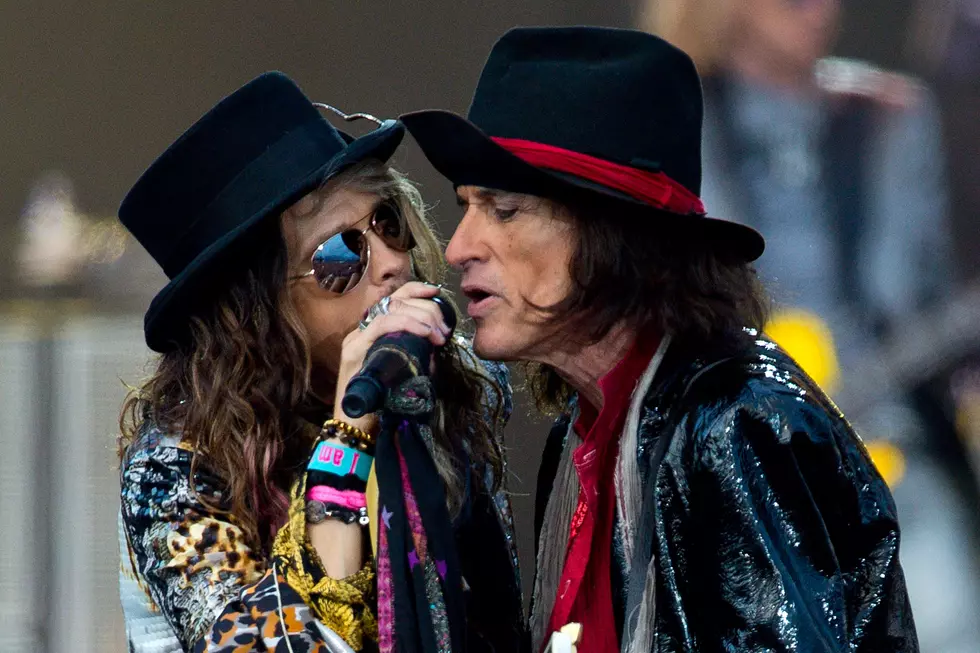
How ‘Walk This Way’ Opened the Door for Aerosmith’s Next Chapter

Aerosmith and Run-D.M.C. locked together for a collaboration that catapulted both groups to a new level of fame more than 35 years ago.
Revisiting Aerosmith's "Walk This Way," originally from 1975's Toys in the Attic, was an idea that was hatched in part by producer Rick Rubin. The members of Run-D.M.C. were skeptical about the proposed pairing. But Aerosmith guitarist Joe Perry was much more open to the idea when he received a call from Rubin. Perry's son was a fan of the rap trio's music. "[Their] sound was like a freight train," Perry recalled in a 2014 interview. After a wilderness period that saw Aerosmith members shuffling in and out of the band, the group began to reassemble its classic lineup. But it was a rocky period at first that eventually gave way to 1985's Done With Mirrors.
"Sometimes, I think we did everything wrong. We weren’t quite back together yet," Perry tells UCR. "We had done a tour with no record. We couldn’t get signed. No record company wanted anything to do with us."
Done With Mirrors met with a disappointing reception upon release, but it would help to lay the groundwork for the Boston band's return to platinum success with 1987's Permanent Vacation. Along the way, the unlikely union with Run-D.M.C. provided a needed boost. Their collective refresh of "Walk This Way" reached the Top 5 in 1986.
As Perry preps for a string of dates with the Joe Perry Project (before his return to his main gig), he discusses the band's history and other highlights from the past half-century.
As Aerosmith moves past the 50-year mark, it is something, everything the band has done. Not just the albums, but also things like Wayne's World, the collaboration with Run-D.M.C.
Yeah, well. [Laughs] You know, let’s put one more notch on the chalkboard. When we start going down the list of things like that, it kind of blows my mind. That’s one of the things we’re going to try to bring back. Because we did a lot of things for the first time that just aren’t [well-known] in the grand scheme of things now. It’s old news, kind of. I mean, our fans know about it, but probably the biggest thing was doing the Run-D.M.C. thing. That was historic. We literally broke down walls with that. We didn’t sit down and plan that, it just happened and it was great, just the way everybody came together with that. Steven [Tyler] and I actually sat in with them at a couple of their shows. They would come up and play with us [as well]. But what it did for music, getting rap on MTV for the first time, it was big. It was a lot more than just having a really big video on MTV. It was the video, it was the benchmark that changed things. I’m just really proud that we were a part of that. Breaking down the walls between the two of us, the symbolism was just really amazing.
Watch Aerosmith and Run-D.M.C.'s 'Walk This Way' Video
How much did it feel revolutionary at the time?
I could see what Rick was talking about when he was talking about “Walk This Way” being proto-rap. Because again, Steven used the lyrics kind of like rappers use lyrics to be part of the rhythm. Especially back then in its earliest forms. It’s music with just drums. I’ve always thought of rap as the next step from blues. It was the music that guys were playing on street corners, singing about life -- with a boombox. That’s the same as blues was in the ‘20s, with guys sitting on the street corner or playing in the corner in a club and getting people dancing and singing about life. Their life. That’s why it was so important for rap to come out. When Rick said that about “Walk This Way,” I could see the direct connection between the funk because the guys were sampling a lot of stuff from the rock bands, the kick drums for their drum sounds and stuff. It seemed like a natural next step. At least I could see it. I was just glad to be the band to do it.
How do you think the experience of doing that ultimately affected Aerosmith from that point forward?
I think a lot of people thought that was the thing that saved us or really bumped our career up another notch. Well, it did. I mean, we got a big single out of it again and it brought that song out for everybody to hear again. It really didn’t make much of an impression on us, like day to day. We really don’t follow that stuff that much. But when we went to Europe, there were people who came up to us and said, “Wow, this is great, do you guys have any other records?” There were a lot of people, it was the first time they’d ever heard of Aerosmith. We didn’t really tour much there in the ‘70s, as much as we should have. We were kind of blown away to hear that kind of stuff. That kind of busted Europe open for us. In a lot of ways, we got played in places in America that we normally wouldn’t have gotten played. Looking back at it, the numbers certainly tell that it was a boost. But for us, we were on the road, we’re playing, the band’s rocking, the fans are there and it was like business as usual. Except this was making history.
How do you look back at the 50-year legacy of Aerosmith?
I look back at it as a lot of events that by all rights we shouldn't have gotten as far as we got. We've been talking about it, of course, when you're talking about 50 years, you're bound to think about it and talk about it with the other guys. I think back to the days of all living in that apartment and going, "Well, it's us against the world," still feeling like we had something to offer, even though we're listening to Led Zeppelin IV. We were definitely the next generation of bands. Every two years, there was another evolution of new music that would inspire people. Now, I've run into people and musicians and they talk about seeing the band and hearing the first record and all of that. The third record, seeing us in the '70s [and stuff like that]. I kind of cringe, because I know some of them weren't our best performances, but those were the things that inspired them to come out and pick up a guitar.
Looking back, I've got to say that we overcame a lot of odds. Half of it, people don't know the half of. I don't know that it will ever come out. But we know. But the fans, when we talk about playing a deep cut or something and people aren't standing on their seats, they're not walking out either. They're interested to hear a song that they might never have gotten to hear.





